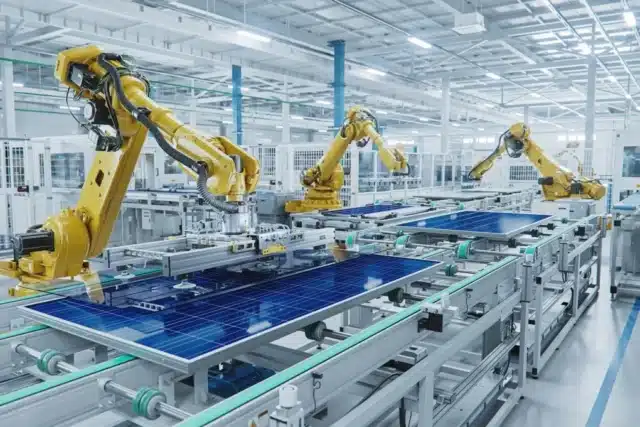AI For Resilient Business Development
AI For Resilient Business Development
July 31, 2024
The integration of AI in the business landscape is transforming how companies operate, interact with customers, and manage their internal processes. According to IDC’s Survey, 66% of organizations worldwide are exploring the potential of AI.

AI is reshaping how companies work. It’s changing customer interactions and internal processes. This tech revolution is not just for big corporations. Businesses of all sizes are finding ways to use AI. From chatbots to data analysis, AI in business is making work easier and smarter.
The AI revolution in business
AI’s influence extends across various sectors, reshaping operational paradigms and driving innovation. Its transformative power is particularly evident in three key industries:
- Business, legal, and professional services: These sectors are leveraging AI to enhance decision-making processes, streamline operations, and provide more efficient, data-driven services to clients.
- Media and telecommunications: AI is revolutionizing content creation, personalization, and delivery in these industries, enabling more targeted and engaging user experiences.
- Technology: As the birthplace of AI, the tech industry continues to push boundaries, developing and implementing cutting-edge AI solutions that ripple across other sectors.
AI’s role in reshaping customer engagement and internal business processes cannot be understated. Here are some detailed applications:
- AI improves customer service: Smart chatbots and automated systems provide 24/7 support and quick answers to customer questions.
- Better cybersecurity: AI tools detect and prevent fraud more effectively, protecting important data and financial transactions.
- Digital assistants boost productivity: AI-powered tools manage schedules, automate routine tasks, and provide instant information support.
- Efficient manufacturing: AI enhances production through predictive maintenance, quality checks, and supply chain improvements.
- Better SEO: AI algorithms improve search engine rankings and increase website visibility.
- Task automation: AI automates repetitive work across departments, allowing employees to focus on more important tasks.
- Personalized customer experiences: AI tailors marketing and product suggestions to individual preferences, increasing customer satisfaction and loyalty.
The integration of AI varies across different levels of organizational structure:
- C-Level executives: With a 15% usage rate, top-tier management is increasingly recognizing AI’s strategic importance. They’re leveraging AI for high-level decision-making and long-term planning.
- Senior managers: This group shows the highest combined personal and professional use of AI. They’re at the forefront of implementing AI solutions to drive departmental efficiency and innovation.
Mid-level managers: Despite lower engagement rates, possibly due to access barriers, mid-level managers are crucial in the successful adoption of AI. Bridging this gap could unlock significant potential for organizations.

Benefits of AI in business
As AI technology continues to advance, its impact on business will only grow. Forward-thinking companies that strategically integrate AI into their operations can unlock new levels of performance and create value in ways previously unimaginable.
Saving time and increasing revenue
AI is changing how businesses work by operating non-stop. This perpetual operational state transcends traditional human limitations, enabling a 24/7 work cycle allowing for constant work and increased output.
In factories, AI-powered automation can increase production by up to 20%. This is done using advanced technologies that keep quality consistent and make the best use of resources, reducing waste and improving equipment performance.
Customer service operations have experienced a similar transformation. AI-powered chatbots and virtual assistants now offer help at all hours. Many organizations report a 30% reduction in customer service costs post-AI implementation, while also improving customer satisfaction.
By automating routine and repetitive tasks, AI serves as a cognitive augmentation tool, allowing human workers to focus on higher-order thinking and complex problem-solving. This shift represents a fundamental reallocation of human cognitive resources towards activities that leverage uniquely human capabilities such as emotional intelligence, creativity, and strategic thinking.
A new way of working called “human-AI collaboration” is becoming popular. Employees are moving into roles that involve overseeing AI systems, ensuring AI is used ethically, and designing how humans interact with AI. This change makes jobs more satisfying and encourages new ideas by letting employees work on more challenging and important tasks.
Providing business insights
AI is changing how decisions are made in many industries by quickly analyzing large amounts of complex information. Machine learning algorithms, particularly deep learning models, can identify intricate patterns and correlations that would be imperceptible to human analysts.
For example in retail and e-commerce, AI-driven demand forecasting models integrate multiple data sources – including historical sales data, social media trends, and even weather forecasts – to optimize inventory management and supply chain operations. This level of predictive capability allows businesses to reduce carrying costs, minimize stockouts, and improve cash flow management.
AI enables a level of personalization that was previously unattainable, allowing businesses to tailor their products, services, and marketing efforts to individual customer preferences at scale. Some companies report increases in conversion rates of up to 20% through AI-driven personalization strategies.
Netflix, for example, estimates that its personalization and recommendation system saves the company $1 billion per year through increased customer retention and reduced marketing costs.
Reducing errors
In tasks like image recognition, natural language processing, and complex calculations, AI consistently achieves high accuracy rates. Unlike humans, AI doesn’t suffer from fatigue, emotional fluctuations, or distractions. This consistency translates to more reliable outputs, especially in repetitive tasks that require sustained attention to detail.
In the realm of fraud detection, AI algorithms can process thousands of transactions per second, identifying suspicious patterns with a level of precision that would be impossible for human analysts to match consistently. Natural language processing models have reached human parity in tasks like translation and comprehension, with error rates dropping below 5% in some benchmarks.
While AI systems excel in many areas, it’s crucial to note that human oversight remains invaluable. The symbiosis between human expertise and AI precision often leads to the best outcomes, combining the strengths of both
Increasing revenue
The implementation of AI technologies often results in a dual benefit of cost reduction and revenue growth. Automation of routine processes leads to significant labor cost savings and increased operational efficiency. McKinsey estimates that AI could potentially deliver additional economic output of around $13 trillion by 2030, increasing global GDP by about 1.2 percent annually.
Moreover, AI-enhanced customer experiences often translate to higher sales and customer lifetime value. Companies that leverage AI for continuous product improvement. Tesla’s strategic use of AI across various aspects of its business has significantly contributed to its revenue growth. From autonomous driving and manufacturing efficiency to enhanced customer experiences and energy management, AI is at the heart of Tesla’s innovation.
Gaining competitive advantage
AI-driven insights enable faster innovation cycles and more agile responses to market changes. This agility is particularly crucial in fast-moving industries where first-mover advantage can be a key determinant of success.
Amazon’s use of AI in supply chain optimization is a prime example of how AI can create a sustainable competitive advantage. By leveraging machine learning algorithms to predict demand, optimize inventory levels, and streamline logistics, Amazon has set new industry standards for delivery speed and reliability.
AI also enhances regulatory compliance and risk management by providing real-time monitoring and predictive analytics capabilities. In industries such as finance and healthcare, where regulatory requirements are complex and constantly evolving, AI-powered compliance systems can significantly reduce the risk of violations and associated penalties.
Providing real-time information
AI enables instantaneous, context-aware communication with customers, transforming the nature of customer engagement. Natural Language Processing (NLP) and sentiment analysis technologies allow businesses to understand and respond to customer needs in real-time, across multiple channels.
AI-powered marketing tools can send targeted offers based on a customer’s current behavior and past preferences. This allows for personalized marketing on a large scale. Companies using these tools often see better results in their marketing campaigns.
In customer service, AI can answer questions immediately, reducing wait times and solving problems faster. It can also spot and fix potential issues before they become bigger problems, making customers happier and more loyal.
Predictive maintenance
AI is also changing how businesses maintain their equipment. By analyzing data from sensors and past performance, AI can predict when machines will need maintenance or are likely to break down.
This approach is different from waiting for equipment to break or doing regular scheduled maintenance. In manufacturing, AI-powered maintenance solutions have cut maintenance costs by up to 20% while making equipment last longer and reducing unexpected breakdowns.
Predicting maintenance needs also improves safety by identifying potential hazards before accidents happen. This is especially important in industries like aviation, where equipment failures can be very dangerous.
The implementation of predictive maintenance strategies also contributes to sustainability efforts by optimizing resource utilization and reducing unnecessary part replacements. This aligns with the growing emphasis on environmental, social, and governance (ESG) factors in business operations.

Challenges of AI in business
As businesses rush to embrace artificial intelligence, they often encounter significant hurdles that can hinder successful implementation. Here are 5 key challenges companies face when integrating AI into their operations and strategies.
- Data quality: Poor data quality can result in significant risks to business strategy and operations. Businesses must invest in robust data collection and cleaning processes. This ensures that AI algorithms have accurate, comprehensive information to work with.
- Balancing cost and benefit: AI implementation often comes with a substantial price tag. This is especially challenging for small and medium-sized enterprises (SMEs). Business leaders must carefully weigh these expenses against potential long-term benefits.
- The talent gap: There’s a global shortage of AI specialists. This scarcity makes it difficult for businesses to find the right talent for effective implementation and management of AI systems. This often requires innovative recruitment strategies and compelling compensation packages.
- Ethical considerations: AI raises critical issues around data privacy, security, and algorithmic bias. These concerns can have serious legal and reputational consequences if not properly addressed.
- Technical integration: Many businesses struggle to integrate AI with older, incompatible systems. This process can be complex, time-consuming, and disruptive to ongoing operations.
Balancing AI and human personalization in customer service
Finding the right balance between AI efficiency and human empathy is crucial for delivering exceptional customer experiences. Here are 3 key strategies for successfully integrating AI:
- Start with a strategy: Before adding AI to your business, make a detailed plan with specific goals. Think about what you want AI to do, like improving customer satisfaction or making your work more efficient. Set measurable targets to check if AI is helping. This plan will guide how you use AI to support your long-term business goals and values.
- Using AI to support human workers: AI should help, not replace, your human staff. Use AI for tasks that involve lots of data and simple customer questions. This lets your employees focus on more complex issues that need human understanding. By doing this, you keep the personal touch that customers like, which is important for keeping them happy and loyal.
- Regularly checking and improving AI systems: Keep a close eye on your AI systems and adjust them as needed. Don’t just set up AI and forget about it. Instead, treat it as a tool that needs regular updates. Check how well the AI is working compared to the goals you set. Ask customers and employees what they think to make the AI better. Also, stay up to date with new technology and market changes. This ongoing process helps make sure your AI keeps meeting the needs of your business and customers.
AI is a game-changer for making businesses stronger and more adaptable. AI for business development is not just about using new tech – it’s about rethinking how we work and grow. As we look to the future, AI will play a big part in helping companies stay ahead and thrive.
The Makeover 2024 is Talentnet’s big annual event for forward-thinking business and HR folks. It’s designed to give you fresh ideas for more resilient growth. This event is all about bringing together top speakers, hot workforce topics, and ideas for green growth. It’s perfect for business leaders like you who want to drive change and make their strategies greener.




